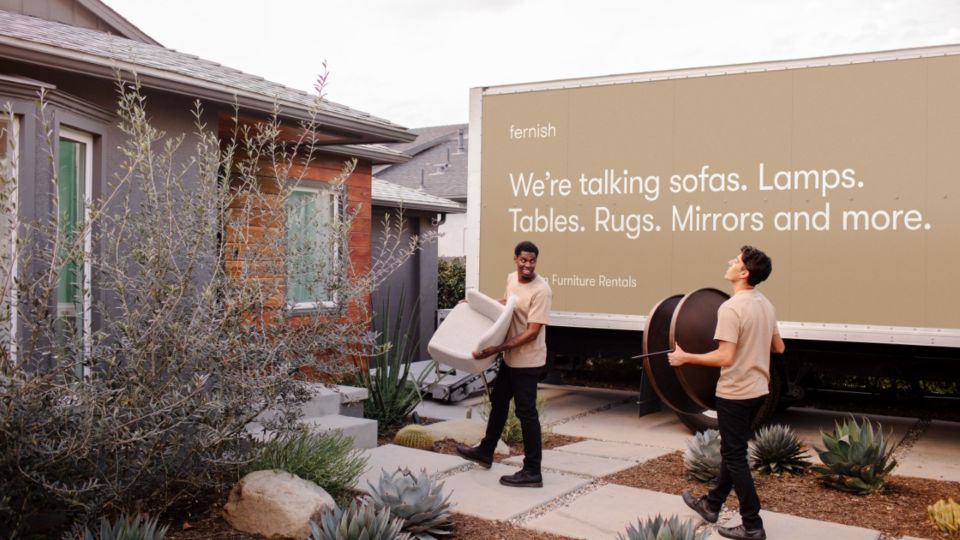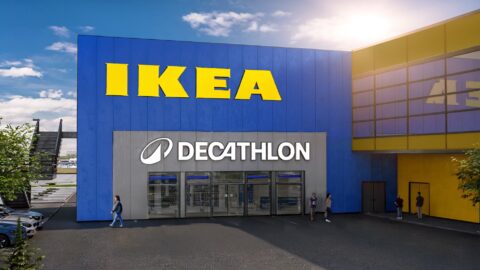The pandemic has normalized working from home, creating a ripple effect in the business world. It has encouraged many organizations to rethink their telecommuting practices, shrink the size of office spaces and, in some cases, shutter offices completely. More than half of Americans want to continue working remotely, which has encouraged 21 major companies, including Google, Uber, American Express and Airbnb to extend their work-from-home policies, according to Business Insider. These realities have provided individuals and families with an entirely new level of control over not just where they work, but where and how they live.
Fernish, the furniture company that Fast Company called “Rent-the-Runway, but for sofas,” is capitalizing on this expanded flexibility and mobility by giving consumers the power to design their work-from-home spaces with high-quality desks, office chairs and more. Fernish defines its furniture as “circular-ready,” a trademarked term describing the “durable and modular” process that helps give products a second life. Circular readiness is achieved through a combination of parts and fabric replacement, as well as an 11-step sanitation and refurbishment process that uses sustainably sourced materials.
Additionally, touting itself as a “commitment-optional” brand, Fernish offers a variety of rental periods — from two months to one year. Consumers have the option of buying out products at any time. The company has established partnerships with furniture brands including CB2, Crate & Barrel, Floyd and Campaign, so consumers can easily outfit their entire homes.
This business model “removes a lot of the burden” consumers face as they strive to navigate the implications of working from home, and it has given Fernish a strong competitive advantage during the pandemic, according to Michael Barlow, Co-Founder and CEO of Fernish. “Everyone has shifted to ‘work from home’ to some degree, so if you need a setup for six months, we’ve got you, but if you need to extend, you can,” he said in an interview with Retail TouchPoints. He added that many people, including himself, have relocated to new cities to get a change of scenery, either for the short or long term, which is adding a new dimension to the Fernish use case.
“The big post-pandemic macro trend is that people are no longer tied to a certain city due to their jobs,” Barlow noted. “If you lose the anchor of an office and remote work rises, mobility is only going to increase. It’s really going to impact the generation behind us in a significant way, bringing them to smaller cities that are likely going to grow due to their lower cost of living.”
Eliminating the Burden of Buying Furniture
But even before COVID-19, Fernish’s target consumer always had a desire for more flexibility and control around the furniture shopping process — and it has been baked into the business model since day one. When Barlow and his co-founder Lucas Dickey launched the company in 2017, they both were at the tail end of a wild journey filled with new jobs, new roommates and new apartments. Barlow moved five times in seven years between New York City and Los Angeles, and Dickey moved seven times over the course of a decade along the west coast.
Their experiences, along with a series of consumer surveys, pointed to a clear pain point for Millennial and Gen Z consumers: as they hop from job to job and city to city, they don’t want to deal with the headache of storing furniture or lugging it from place to place. In search of flexibility and cost efficiency, these demographics rely on fast furniture to fill their spaces. However, low price points and even lower quality mean these pieces are largely abandoned or thrown away, adding 9.8 million tons of furniture into landfills each year.
Barlow and Dickey created Fernish to serve consumers who love stylish furniture but didn’t love the steep prices associated with storing, moving and, in some cases, rebuying furniture — even as life took them across the country. In 2020 alone, the company helped customers save $20 million via its rental-based business model.
“There’s that time, from when you’re 22 to your early 30s, when you don’t have that crystal ball for your life,” Barlow explained. “You don’t have that level of certainty around what’s next — and you don’t necessarily want or need it. Your life, city, job and relationships are all going to change, and the items in your home should be able to change and progress with you.”
Michael Barlow, Co-Founder and CEO, Fernish
With such an agile, customer-driven business strategy, stellar logistics are crucial to making the circular model work, according to Barlow. “We’ve put a lot of resources into building our own proprietary logistics system that allows us to understand our entire suite of assets — where they are, when they’re coming back and the quality of products. It’s a game of ‘furniture Tetris’ that we built using in-house technology.” As a result, Fernish has successfully put thousands of pieces into their second and third cycle, using proprietary techniques to maintain their quality in a sustainable way.
Sustainability: An ‘Added Perk,’ Not a Core Value Prop
From an experience standpoint, Fernish helps eliminate a lot of the fear, uncertainty and doubt that goes into the furniture shopping process. Whether shopping for a living room or bedroom, consumers need a lot of time to filter products, measure them and determine what best meets their personal style preferences, needs and budgets. And when a piece finally arrives at the customer’s doorstep, there’s no guarantee they will love how it looks in their space. That’s why, in addition to offering free delivery and assembly, Fernish allows customers to “test out” items in their home for three days. If they don’t love the look, they can exchange a piece for a new design, free of charge.
Furniture is “a really cumbersome category that has not evolved with customer behaviors,” Barlow added. “Meanwhile, we’re seeing service economy companies like Uber and delivery solutions for food and grocery. Furniture is a retail, old-line dominated category that hasn’t paid attention to consumers under 35 simply because they don’t have the disposable income. That’s the corner of the market that we want to latch onto.”
But the “added perk” for Barlow and Dickey is that their circular-ready, service-oriented business model serves a deeper, sustainability-driven purpose. Although keeping low-quality furniture from ever entering circulation is their ultimate goal, Barlow noted that sustainability is more of a higher purpose than a core value proposition. “As part of the global corporate accelerator program for IKEA in 2019, we spent time understanding the European and American consumer. While Europe is highly motivated by sustainability, U.S. consumers don’t make these kinds of purchases around sustainability. It motivates our team and is our business’ higher purpose, but our mission is to make it effortless to create your home.”
With a growing number of individuals and families breaking free from their households and embracing a mobile lifestyle, Barlow believes that the furniture space will undergo seismic disruption. “With a more mobile population, there will be more people moving who care what their homes look like. They don’t want a cardboard bookshelf that you can’t move or a dresser that crumbles when you take it out of the moving van. A service economy solution is a perfect fit for our consumer.”













